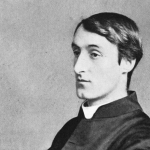I. He Thinks of the Chinese snake Who Is the Beginning and the End
If you or I should die
That day desire would not renew
Itself in any bed.
The old snake of the world, eternity
That holds his tail in his mouth,
Would spit it out
And ease off through the grass
Like a piece of music
To we don’t know where.
Then it would be for the living
To beat the grass and bring him back.
But would he be set tamely
To sucking his tail again
In that absence?
II. He Marvels at the Persistence of Passion
Like black duennas the hours sit
And read our lips and watch our thighs.
The years are pederasts: they wait
For boys and will not meet my eyes.
And children are cool astronomers
Who scan us like old galaxies
And calculate how many years
Before we’ll turn to gas or freeze.
And yet sometimes I have to shave
And brush my teeth at dawn to keep
My healthy middle-aged alive
Hands off you where you lie asleep.
III. Sometimes He Contemplates Adultery
I had no insanity to excuse this,
But for a week my heart ran with another love,
Imagined another house, down to its books and bed.
My miserable fluttered heart, you understand, chose this.
Now I am led home—cold, grave,
Contractual as a dog—by my scurrilous head.
IV. His Hands, On a Trip to Wisconsin
My hands lie awake and are aware of themselves,
One on my noisy chest, the other, the right one,
A matter of several pounds, oppressing my forehead.
It is a week since it fluted the air goodbye.
I think of the path in space the thing has made since then,
Veering and halting; of the shapes hands make
Two shapes it has traced honor this right hand:
The curve that a plane rides out
As it leaves or takes a deck on the scalloped sea;
Handily, handily then this two-pound creature
Felt the wired air, let the two monsters kiss,
The shapes that it graphed then fairer
Than the hair of the clouds that watched
Or the sea’s own scalloped hair.
And he and his gauche fellow, moving symmetrically,
Have described one body so well
They could dress that shape in air
As they long to do now though they lie
Laced hunks of flesh on my belly—
Ahead of them some years of roving
Before the white landscape of age checks them,
Your body’s disaster, sure to be traced there,
Even so slight a change in a dear shape
Halting them, baffled, lascivious suddenly,
Or folded cold, or feeling your hands folded cold.
V. Lines from His Guest-book
Shelley’s houses and walks were always a clutter of women,
and god knows what further arrangements he kept in his mind.
Drôle de menage, Rimbaud said of himself and Verlaine,
As if there were any other kind.
In Yeats’ tower, in all that fakery of ghosts,
Some solid women came and slept as Mrs. Yeats’ guests.
We are most our own strange selves when we are hosts.
Here those who have loved or befriended me came to a proof:
They must lodge in my head and in company under one roof.
Keeping house is the instinct of love; it is always a little ridiculous.
Yet it is with no light welcome we welcome the friends of the house.


















Comment form: